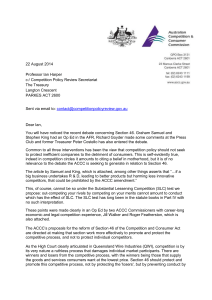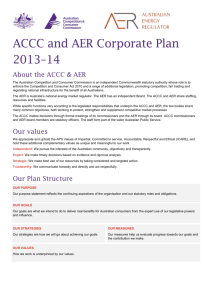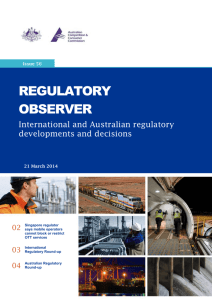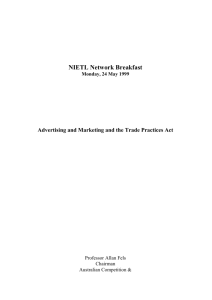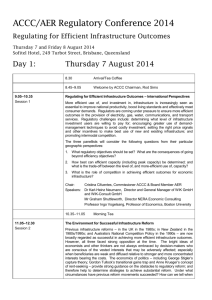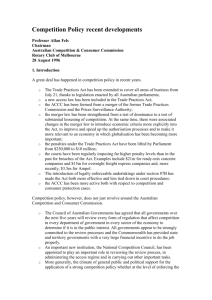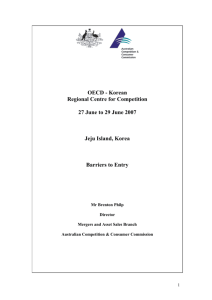2. International Dimensions of Competition Policy
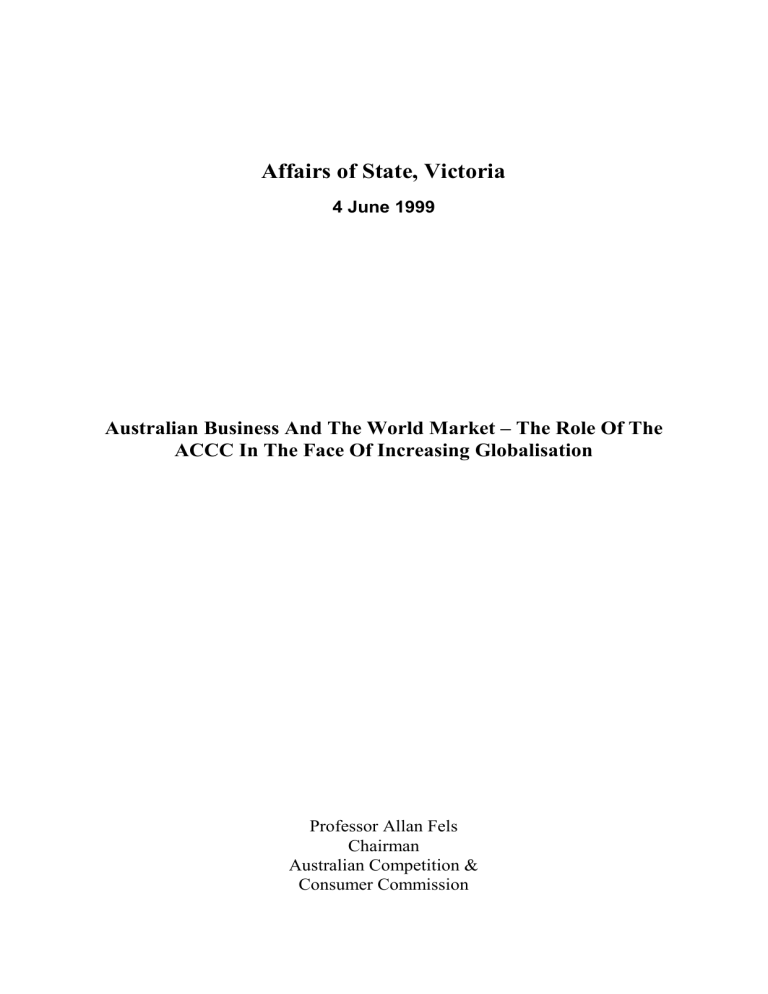
Affairs of State, Victoria
4 June 1999
Australian Business And The World Market – The Role Of The
ACCC In The Face Of Increasing Globalisation
Professor Allan Fels
Chairman
Australian Competition &
Consumer Commission
1.
Introduction
Profound changes continue to occur in international trade and commerce, through rapid growth in international trade and increasing globalisation of commerce. These changes are driven by dramatic improvements in computer technology, communications and transportation. At the same time, there is a global trend towards reducing regulatory barriers to trade and commerce and increasing internationalisation of capital and financial markets.
The Australian economy has reflected these changes, and in some areas Australia has been at the forefront, particularly in the area of reducing trade restrictions in the forms of tariffs and quotas.
In light of this changing global marketplace, the Australian Competition and Consumer
Commission is facing a number of challenges in its role as the statutory authority responsible for ensuring compliance with the Trade Practices Act. Today I propose to briefly discuss international dimensions of competition policy and the impact of globalisation on some of the areas of the Commission’s work.
2. International Dimensions of Competition Policy
Australian competition policy discussion has focussed very largely on domestic competition policy issues. The focus of the Hilmer report was on the non-traded goods and services sector and its charter did not extend to considering international developments. In fact, the world agenda for competition policy is important both globally and domestically because it affects
Australia’s capacity to trade with other countries and in particular to enter their markets without facing any competitive restrictions.
There have been several developments in the area of global competition policy in light of this increasing interdependence in parts of the world economy. For example, substantial bilateral agreements between countries in relation to cooperative action against anti-competitive conduct have been reached. The most important bilateral agreements are between the United
States and the European Union, but there are other significant agreements between the United
States and Canada, the United States and Australia, and Australia and New Zealand.
1
There are also moves towards establishing plurilateral agreements. The OECD has recently reached an agreement between its members to cooperate in action against “hard core” cartels.
Additionally, some efforts are being made to harmonise the processing of multi-country mergers. For example, the OECD is working on a standard form of merger assessment for its member countries.
A great deal of activity is also occurring in the area of the trade and competition interface.
There are, for example, general attempts to achieve ‘convergence’, meaning that every country in the world adopts a competition policy and enforces it appropriately. Convergence is being achieved by means of education, seminars, pressures from international agencies on different countries, pressures to make the administration of competition policies more transparent and so on. Some success is being achieved. Numerous third world countries are now studying competition policy. OECD countries are trying to be more transparent about the way in which they apply their competition policy. Finally, there are some progress on multilateral adoption of a competition policy with the World Trade Organisation setting up a working group to enquire into the links between trade and competition policy.
I will now discuss some of the areas of the Commission’s work in which the issue of globalisation is particularly relevant. Firstly, I will discuss merger law.
3.
Mergers
The ACCC tries through merger law to stop unjustified increases in the concentration of market power. Merger law is especially important given the absence of a divestiture law in
Australia that enables existing firms to be broken up. Mergers have a profound effect in shaping the competitive structure of the economy in years ahead. Essentially a balance must be struck between allowing through with as little difficulty as possible good mergers that increase efficiency and do not harm competition and opposing undesirable and unhealthy mergers.
2
A global merger wave is occurring. The US authorities are dealing with three times as many mergers as normal at present. Australia is not exempt.
In the news lately has been the Coca-Cola/Cadbury Schweppes proposed merger. The
Commission opposed this merger, concluding that here would be a substantial lessening of competition in the market for the production and wholesale supply of carbonated soft drinks in Australia. The ACCC’s inquiries indicated that carbonated soft drinks are close substitutes with one another and that price rises in carbonated soft drinks do not lead to substantial switching of purchases to other beverages, like juices. For example, if there was a price rise in one carbonated soft drink, demand switches to other carbonated soft drinks more so than to other beverages.
The proposed acquisition would have seen the share of the Coke business move from 65% to around 75% in the soft drink market. The Coke business has an extensive distribution system, with the large majority of Australia’s beverage vending machines and a network of exclusive accounts for post mix. The ACCC considered that no competitor could have provided an effective constraint on the merged firm. With barriers to entry or expansion on a national scale in the relevant market being very high, the ACCC was concerned that the removal of the
Schweppes international brands as a vigorous, effective and innovative competitor to the
Coke business, would be likely to eliminate any real prospect of effective future competition, potentially giving Coke business control of the carbonated soft drink market in Australia.
The merger parties have put to the Commission a revised proposal which still involves the acquisition by The Coca Cola Company of the international beverage brands of Cadbury
Schweppes, namely Schweppes , Canada Dry and Dr Pepper . However, the revised proposal envisages that Cadbury Schweppes Australia will acquire all carbonated soft drink brands currently owned by Coca Cola Amatil and not licensed from The Coca Cola Company. The
Commission is in the process of assessing this revised merger proposal.
3
The ACCC further opposed British American Tobacco Plc’s proposed world wide merger with Rothmans International. The ACCC conducted extensive market inquiries into this matter and concluded that the merger was likely to breach the provisions of the Trade
Practices Act. The merger would have given the merged group a 62% share of the Australian cigarettes market. The ACCC’s view reflects its concern about the likely impact of the increase in market concentration and the merged group’s control of major Australian cigarette brands, in a market where import competition is negligible and barriers to entry are substantial. The potential for import competition to increase is limited by barriers to establishing retail distribution links independently of incumbent suppliers, the existing trading arrangements between manufacturers and retailers that would restrict the opportunities for new entrants to gain brand visibility, brand recognition and brand loyalty among smokers, and restrictions on advertising that limit opportunities to build brand images.
The merger parties offered the ACCC a divestiture proposal to address concerns about the effect on Australian competition of the proposed world-wide merger. On 3 June the
Commission announced that it has accepted a court-enforceable undertaking for divestiture of cigarette and roll-your-own tobacco brands to Imperial Tobacco Group PLC.
It is clear that merger law is not getting in the way of firms that need to achieve the scale necessary to take part in world markets. In fact, the Commission has opposed no mergers where there is significant import competition and this is the area where the claim that large size is necessary to take part in world markets is most relevant. However, even apart from that, the Commission opposes relatively few mergers. Our total rate of opposition to mergers is around five per cent a year, and some of them are eventually overcome by undertakings given to the Commission. In the small Australian economy, unlike the USA, our law permits anticompetitive mergers where, as part of the authorisation process, they can be shown to bring a sufficient benefit to the public, e.g. lower prices. Over half of authorisation applications are successful.
4. International Cartels
I will now discuss price fixing cartels.
4
The ACCC seeks to break up cartels that cause high prices, high costs, inefficiency and unfairness in all parts of Australia. The ACCC has taken court action in relation to pricing fixing against freight express and concrete companies, and more recently against Pacific
Dunlop over foam used widely in Australian furniture; WD & HO Wills for cigarettes in
South Australia; Inghams and Steggles in chicken markets in South Australia; McPhees
(fined $4m for freight express services in Victoria although the matter is on appeal); North
West Frozen Foods and others for fixing prices of frozen foods to restaurants, hotels and convenience food outlets throughout Tasmania, and others.
The ACCC is involved in around 35 Federal Court cases at any one time. Around $200 million has been paid in total penalties, refunds and compensation in ACCC cases since the mid 90s. The deterrent effects of penalties, and bad publicity on other firms, as well as those caught, have been many times greater.
There has been an increase in international cartel behaviour, that is, firms located in different countries agreeing on prices or on who gets which customers. This rise follows the lowering of trade barriers around the world. The private sector often reacts with agreements designed to offset the pro-competitive effects of trade liberalisation.
The United States Department of Justice is currently pursuing some 35 international price fixing cases at present and last month announced it had successfully completed an investigation into an international cartel which operated to raise and fix prices and allocate market shares for certain vitamins sold in the United States and elsewhere. Two European drug and chemical companies pleaded guilty and agreed to pay a record $US725 million in criminal fines for the conspiracy. A third company escaped penalty by supplying investigators with the evidence that broke open the cartel.
The Commission will investigate any Australian link in this world-wide cartel. In April
Australia and the United States signed an antitrust cooperation treaty that allows the ACCC and US antitrust agencies to exchange evidence on a reciprocal basis for use in anti-trust
5
enforcement and assist each other in obtaining evidence located in the other's country, while assuring confidential information is protected.
Such cooperation between international enforcement agencies is likely to increase in the face of growing globalisation.
5. Consumer Protection
As the national competition and consumer protection regulator for Australia, the ACCC has a keen interest in how consumers will be protected in the new global marketplace.
Traditionally, there is benefit in undertaking enforcement action and maintaining an enforcement presence. However, the difficulty for government enforcement agencies, is that many global market operators are situated abroad, which can make detection, apprehension and enforcement action very difficult. In recent years the Commission has increasingly found itself in the position of trying to deal with complaints by Australian consumers about products and services which they have purchased directly from other countries. The Commission has also had to deal with complaints by overseas consumers about products and services they have purchased by direct selling techniques from Australia. These complaints have raised a series of enforcement challenges for the Commission and have driven the ACCC to investigate new ways of enforcing consumer protection legislation. They have also led to us working in closer collaboration with our overseas counterpart agencies who are experiencing similar challenges.
Methods of joint international law enforcement cooperation can include:
sharing enforcement techniques;
sharing information, possibly by developing memoranda of understanding and establishing global cooperative networks;
6
improving mechanisms for international governmental cooperation, by developing mutual assistance treaties and memoranda of understanding; and
adopting a united approach to the development of consumer protection strategies in understanding and addressing issues as they emerge, and in the determination of the type of regulatory structures which will best regulate global market transactions.
The ACCC is already actively involved with existing international government organisations such as the OECD Committee on Consumer Policy and the International Marketing
Supervision Network (IMSN). These forums already help to promote international cooperation between government consumer protection agencies.
An example of this cooperation is the Internet Sweep day that was coordinated by the ACCC in conjunction with the IMSN in 1997 & 1998, and is due to take place again later this year.
The sweep day involves staff from enforcement agencies around the world ‘surfing’ the
Internet for sites that may contain misleading or deceptive information - themes so far have included ‘get rich quick schemes’ and ‘health claims’. Sites which are identified as being potentially in breach are given a warning and asked to address the issues that have been raised, follow up action in 1998 found that 28% of the identified sites had been amended or removed.
Regulation of the internet is proving to be a challenge for consumer protection organisations world-wide. Increased cooperation between agencies is one method being used to undertake enforcement action and maintain an enforcement presence in this area. For example, in 1998 the Commission was contacted by the US Federal Trade Commission in relation to complaints it had received about an internet domain name company based in Australia. The
ACCC, in conjunction with the US Federal Trade Commission, took action against the company for misleading and deceptive conduct. The Commission alleged that the Australian company, Internic Pty Ltd, was misleading consumers by using an almost identical name to the exclusive registrar of domain names in some top level internet domains (the InterNIC) and by operating a website with a very similar name to the InterNIC facility.
7
Earlier this week the Commission announced that Internic Pty Ltd had agreed to place
$A250 000 in an Australian trust fund to be used to refund consumers who were misled by the conduct. All consumers who registered a domain name at the misleading site prior to
May 1998 throughout the world will be e-mailed a notice, setting out the procedural requirements for claiming a refund.
6.
Conclusion
In light of the changing global marketplace, the ACCC is facing a number of new regulatory and enforcement challenges, particularly in the areas of merger law, international cartels and consumer protection. The Commission is working in conjunction with overseas anti-trust and consumer protection agencies to meet these challenges as efficiently and effectively as possible.
8
